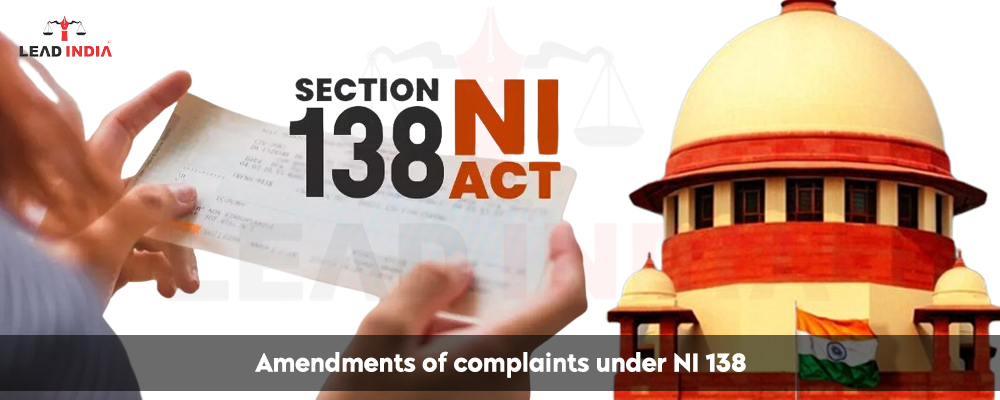The purpose of the 1973 Code of Criminal Procedure is to establish a mechanism for punishing offenders who violate substantive criminal law. The Preamble of the Cr. P.C., which says “An Act to consolidate and amend the law relating to Criminal Procedure,” reveals the legislative aim and object of the Act. The Cr. P.C is designed to be a complete Code that details the procedural mechanisms for conducting criminal trials.
Although there is an express provision for amending pleadings (in civil proceedings), there are no particular provisions in the Code dealing with complaint amendment. At the same time, there is no prohibition in the Code against allowing a complainant to amend his complaint.
Need A Legal Advice
The internet is not a lawyer and neither are you. Talk to a real lawyer about your legal issue

Amendments Of Complaints Under Negotiable Instrument Act 138
U.P Pollution Control Board v. Modi Distilleries, (1987) SCC 684, was one of the first decisions in which the Hon’ble Supreme Court explored the scope of criminal complaint amendments. The accused company’s name was incorrectly reported in the lawsuit as Modi Distilleries rather than Modi Industries Limited, and this was sought to be changed. The Hon’ble Supreme Court, viewing the matter as a mere curable legal flaw, remarked that an easily curable legal infirmity in the complaint can be allowed to be corrected through a formal application of modification.
In S.R. Sukumar v. S. Sunaad Raghuram, (2015) 9 SCC 609, the Hon’ble Supreme Court, relying on the aforesaid judgment, held, “if the amendment sought to be made relates to a simple infirmity which is curable using a formal amendment and by allowing such amendment, no prejudice could be caused to the other side, even though there is no enabling provision in the Code, the Court may allow a modification to be made in order to entertain it.
Furthermore, because a Magistrate takes cognizance of an offense and not the offender under Section 190 CrPC, the Hon’ble Bombay High Court, in Mr. Amol Shripal Sheth v. M/S. Hari Om Trading Co. & Ors., (2014) 6 MhLJ 222, held that where the name of an accused is incorrectly mentioned in the complaint4, the complainant may be permitted to amend his complaint.
In Aneeta Hada v. Godfather Travels and Tours Private Limited, the Hon’ble Supreme Court had to decide whether a complaint under Sections 138 and 141 of the Negotiable Instruments Act, 1881 (“NI Act”) could be filed against a Director or Authorised Signatory of a company without joining the company as an accused. The Hon’ble Supreme Court ruled that under Section 141 of the NI Act, the commission of an infraction by the corporation is an express condition antecedent to attracting the vicarious liability of another. Prosecution of other persons under Section 138 of the NI Act is permitted only if the Company is identified as an accused in the complaint.
Furthermore, in N. Harihara Krishnan v. J. Thomas, the Hon’ble Supreme Court ruled that in the context of prosecution under Section 138 of the NI Act, the concept of cognizance of the offense but not the perpetrator is not suitable. According to the Hon’ble Court, the prosecution’s scheme for penalizing under Section 138 NI Act “is different from the scheme of Cr. P.C”. As a result, it was determined that “disclosure of the name of the person drawing the cheque” is one of the factual claims that a complaint must include. Otherwise, in the absence of legal authority to investigate the offense under Section 138, there would be no one against whom a Court could act.
As a result, it is obvious from the preceding that if the alteration sought to be made to the complaint is only rectifying a simple imperfection that causes no prejudice to the accused, the Court may approve it at any point in the proceedings. However, if the revision is not formal and causes prejudice to the accused, affects the basis of the complaint, or is intended to correct incurable faults, it must be refused. Furthermore, such an amendment cannot be utilized to overcome faults that are not legally acceptable. Without question, procedural law serves as a steward of justice; yet, a distinction must be drawn between simply correcting a procedural irregularity and acting in violation of legal prohibitions.
Lead India offers free legal advice and online information, in addition to other legal services. We provide a forum to speak with a lawyer and ask legal questions. Lead India’s solicitors can help you with any legal difficulties. Lead India’s solicitors may assist you with any legal issues. Lead India also provides free online legal help in India. In addition to giving online legal assistance, Lead India allows users to ask specialist questions for free.





 Talk to a Lawyer
Talk to a Lawyer